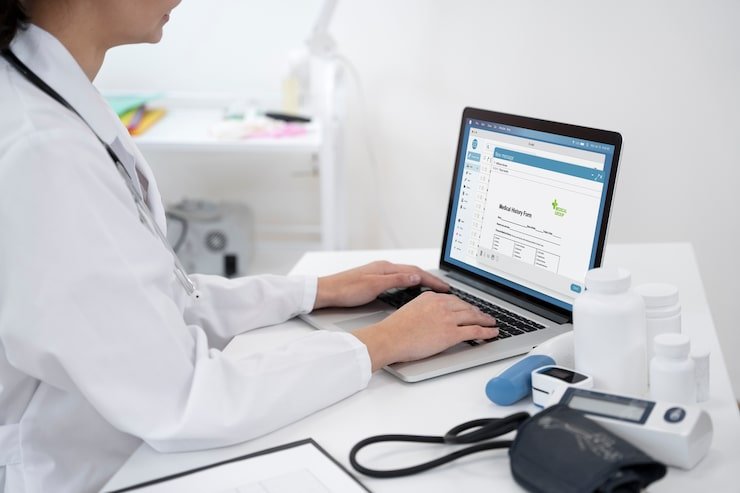Table of Contents
- Introduction
- What Is Health Information Management?
- Why Health Information Management Is Important
- The Role of Health Information Management Technicians
- As a Health Information Management Technician, Why Is the Job Vital?
- Why Choose Health Information Management as a Career?
- Education & Skills Needed for Health Information Management
- How Health Information Management Impacts Patients & Providers
- Technology & the Future of Health Information Management
- Challenges in Health Information Management
- Steps to Start a Career in Health Information Management
- Conclusion
- Top 5 FAQs
1. Introduction
In today’s world of digital healthcare the patient’s data is one important sources. From electronic medical records to insurance claims every bit of data is used to make decisions that impact the lives of people. This is the place Health Information Management (HIM) is a key component.
Many students, job-seekers or even healthcare professionals have the question: “Why health information management?” This article will explain its significance, the function of technicians and why it’s an increasingly sought-after career across the U.S.

2. What Is Health Information Management?
Health Information Management (HIM) is the process of collecting, organizing and safeguarding patient health information. It blends healthcare, business technology, and business to ensure the accuracy of medical records as well as accessible and secure.
The core responsibilities are:
- Management of EHRs, also known as electronic health records (EHRs),
- Ensure that you are in compliance with HIPAA regulations.
- Supporting clinical decision-making,
- In charge of billing and insurance documents.
3. Why Health Information Management Is Important
What is the reason health information management is crucial? Because accurate health information can save lives. The absence or inaccuracy of records can delay treatment, create billing errors and pose a risk to the safety of patients.
Principal reasons:
- High-quality care for doctors: They require solid records to make sure they are able to diagnose accurately.
- Effectiveness in costs: Eliminates the number of duplicate tests and billing errors.
- Data security: Secures sensitive information about patients.
- Research and policy: Helps with research on public health and improvements to healthcare.
4. The Role of Health Information Management Technicians
Health Information Management Technicians (HIMTs) are the foundation of the healthcare information systems. They:
- Check and confirm patient details,
- Proceed with insurance claims processing,
- Medical Coding and Billing,
- Make sure you are in compliance to state and federal laws.
5. As a Health Information Management Technician, Why Is the Job Vital?
As an HIM technician, what makes a job with this particular field important? Because technicians ensure:
- The patient’s information is available when required.
- Claims are processed efficiently,
- Records meet legal standards,
- Healthcare professionals can concentrate on the patient’s care instead of the paperwork.
Without HIM professionals The healthcare system would be in the middle of chaotic administrative issues.
6. Why Choose Health Information Management as a Career?
What are the reasons to choose healthcare information management to be a profession? Because it is a combination of healthcare impact with opportunities based on technology.
There are many reasons to consider this route:
- Demand is growing Demand for jobs: According to the U.S. Bureau of Labor Statistics anticipates an increase in employment that is steady.
- Flexible work environments You can work in hospitals and insurance companies, as well as state agencies and even remote jobs.
- Professional advancement: Career paths to management or data analytics health informatics.
- Happiness at work can directly contributes to improved patient outcomes.
7. Education & Skills Needed for Health Information Management
- Education: Bachelor’s or Associate’s degrees with a major in Health Information Management or Health Informatics.
- Certifications: RHIT (Registered Health Information Technician) or RHIA (Registered Health Information Administrator).
- Skills Attention to detail understanding of coding, IT literacy, and knowledge of laws governing healthcare.
8. How Health Information Management Impacts Patients & Providers
- Patients: Ensure that their your records are secure, accurate and portable.
- Providers: Reduces the chance of errors Improves efficiency, reduces errors, and makes billing easier.
- Companies that provide insurance: Streamlines have received approval to claim.
- Health system: Improves the research process and policies with accurate data.
9. Technology & the Future of Health Information Management
Future of HIM is determined by:
- AI and automation to code and claiming,
- Blockchain for secure data exchange,
- Cloud computing for remote access,
- Big data analytics to aid in health prediction.
As the pace of digital transformation increases, HIM professionals will be more sought-after.
10. Challenges in Health Information Management
- Cybersecurity threats and data breaches,
- The evolving compliance regulations
- Lack of skilled HIM professionals,
- Integration across different EHR systems.
11. Steps to Start a Career in Health Information Management
- You can enroll in an HIM program or Health Informatics degree program.
- Experience practical work through the experience of internships.
- Earn certificates such as RHIT and RHIA.
- Apply for entry-level technician jobs.
- Continue professional development for advancement.
12. Conclusion
Why the need for health data management? It is because it is the basis of a reliable, secure health system that is modern and efficient. HIM professionals ensure that medical data is accurate, secure, and accessible–supporting patients, providers, and insurers alike.
For those looking for a rewarding job that combines health and technology opting for the field of health information management can be an intelligent and long-lasting choice.
13. Top 5 FAQs
1. What is the reason why health information management is vital?
It guarantees accuracy of patient data It improves the quality of care, lowers costs and safeguards confidential information.
2. As a health information manager What makes this job so important?
Because technicians keep medical records accurate, secure, and compliant–supporting smooth healthcare delivery.
3. What are the reasons to choose the field of health information management for a field of work?
It provides a strong growth in employment with a wide range of career opportunities, and the opportunity to combine health and technology.
4. What skills are required for Health Information Management?
Medical Coding, Data Management, IT literacy, compliance expertise and attention to details.
5. What’s the future for the management of health data?
The field is expanding with developments in AI blockchain, cloud computing and digital health records.







